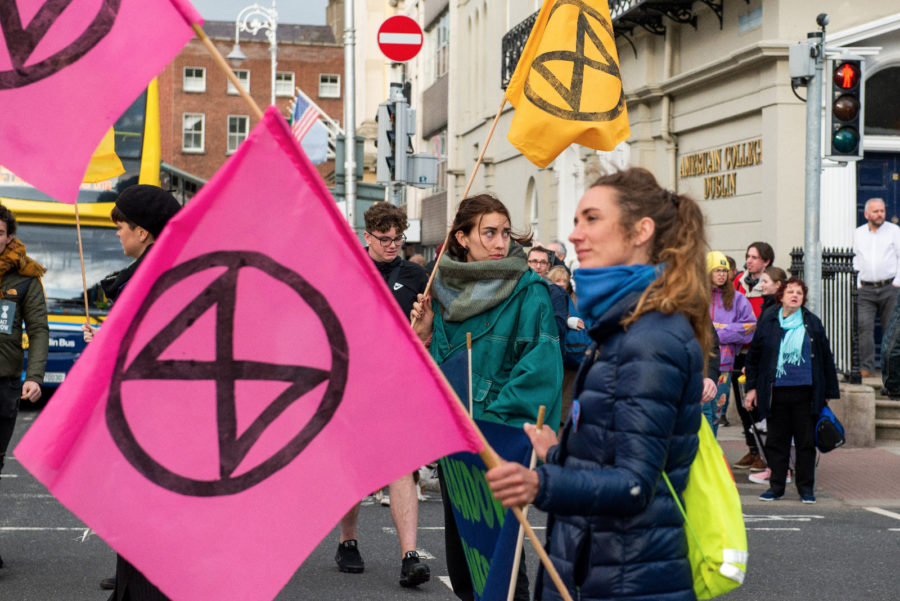The great English chemist James Lovelock conceived the Gaia (Gr. ‘goddess of earth’) Hypothesis in 1972, later developing this alongside American microbiologist Lynns Margulis. Later still, Lovelock, aged eighty-seven, was awarded the prestigious Wolston medal by the Geological Society of London for his pioneering concept.
Now firmly embedded in the zeitgeist, the Gaia Hypothesis posits that unknown forces, popularly conflated with the idea of Mother Earth, nurture our planet’s physical environment to sustain life. To draw on another famous scientific analogy, it might be said that Gaia maintains ‘just rightness’ (i.e. ‘the goldilocks theory’) through righteous homeostasis.
As Gaia approaches her golden jubilee, however – and James Lovelock edges toward his one-hundred-and-first birthday – the evidence mounts against faith in the concept of perpetual renewal; her resilience and raison d’être has been weakened after millennia of selfless resolve .[i] The precipice lies before us.
Gaia has tolerated humanity’s repeated abuses, but only in recent geological time has her mood turned conspicuously (and literally) stormy.
There are, nonetheless, grounds for hope. As Gaia’s health fades, Greta Thunberg’s rage burns ever more brightly. There is an existential ecosystem crisis to be called out, and Greta has risen to the challenge.
A strange energy reverberates whenever this Swedish teenager speaks publicly. Her unflinching delivery is as riveting as a tense drama; her conviction is that of a seasoned stateswoman, with deliciously scathing rhetoric unleashed in staccato rhythm.
Intriguingly, the voice retains the appeal of naivety. Significantly, despite and indeed because of this innocence, the overall effect can be intoxicating to grownups who thought they had lost hope.
‘Futile Nobility’
Greta’s fury has burned a hole in the establishment’s defences. The fire she started has been stoked by public sentiment. A paradigm shift in environmental attitudes is now apparent, but worryingly certain world leaders have adopted a bizarre form of stoicism in the face of Greta’s resuscitation of Al Gore’s ‘Inconvenient Truth’.
Against this backdrop, scientists’ noble pursuit of rigorous data to prove what may seem obvious can seem futile.
For instance, in the recent Special Report on Climate Change and Lands, the Intergovernmental Panel on Climate Change (IPCC), embodying the spirit of righteous scientific detachment, claim only ‘high (but notably not ‘very high’) confidence’ in the (surely self-evident) statement that ‘sustainable land management can contribute to reducing the negative impacts of multiple stressors, including climate change, on ecosystems and societies.’[ii]
There are other examples of such reticence. In the midst of the Sixth Extinction, following on from a century-long campaign of insecticide, a team of UK entomologists published a paper calling for more data on insect declines, state:
we respectfully suggest that accounts of the demise of insects may be slightly exaggerated. Bad things are happening—we agree—but this is not the whole story. We call for hard‐nosed, balanced, and numerical analysis of the changes taking place, and for calm and even‐handed interpretation of the changes, rather than rushing headlong into the hyperbole of impending apocalypse.[iii]
Selling Copy
Political leaders such as the POTUS Donald Trump, and Brazilian President Jair Bolsonaro, a.k.a ‘Trump of the Tropics’, who recently mocked his latest nickname ‘Capitão Motoserra’ (Captain Chainsaw),[iv] provide a jarring contrast to valiant scientific rigour. Sadly but no longer surprisingly, these leaders frustrate efforts to slow anthropogenic ecosystem decay. Sadder still, we are increasingly desensitized to the toxic brew of xenophobia and climate denial.
Whilst posing less risk to the environment than ignorance at world leader tier, the disregard of the most bombastic commentariat is equally galling. Cue journalistic tropes of Alpen-crunching tree embracers, guffawing reference to Ireland’s ecological anti-hero, the Kerry slug, and glib ‘kill the whales, save the plankton’ slogans.
Purveyors of such sensationalist hyperbole do so to sell copy. The shock-jock Jeremy Clarkson wincingly entreats Greta, with misogynistic undertones ‘to be a good girl, shut up, and [don’t] go out in a skirt that short.’[v]
Meanwhile, the self-proclaimed ‘obnoxious, loud, and frequently fired ,’[vi] U.S. Republican journalist Michael Graham is another exploiting an angry white male anti-environmental constituency to garner a following.
For his part, the POTUS has also sparred with the Swedish child activist, in characteristically unbecoming fashion, mockingly referring to this ‘very happy young girl looking forward to a bright and wonderful future.’[vii]
What fun would ensue if the IPCC were to invite Thunberg, Trump, and a band of other incendiary speakers to a public climate debate. The Canadian clinical psychologist and global media star Jordan Peterson could provide ruthless post-match psychoanalysis to provide car crash television on a stratospheric level.
I suspect Thunberg might decline the opportunity as a matter of principle stressing the irrelevance of idle words.
Yet it seems we need Greta to stimulate our senses, deadened as we are by a constant stream of ever-worsening statistics. As an example, take these statements of fact: ‘Nature declines are at rates unprecedented in human history;’[viii] an area of primary tropical rain forest the size of Belgium was lost in 2018,[ix] and these losses exceed those from 2017 when an area the size of a football pitch was lost every second.[x] Is it just me, or do these harbingers come off sounding oddly banal?
Here in Ireland, 85% of habitats, protected under EU Habitat Directives, are in ‘unfavourable status.’[xi] Curlew numbers – whose reverberating cry was once a soundtrack to Ireland’s uplands – have declined by 96% since the late 1980’s,[xii] and may go extinct within five to ten years. Such statements sting and depress, but many of us seem desensitized by over-stimulation in a mediated age.
Eco-thinkers
‘Ms.’ Thunberg, as she is sometimes addressed with mocking respect by her dissenters, is inarguably an ecological ‘thought leader.’ That term seems to have been first used to describe American philosopher and early ‘eco-thinker,’ Ralph Waldo Emerson, who was said to have ‘the wizard-power of a thought leader.’
As we face down the ecosystem crisis, we need more environmental thought leaders to stand on the shoulders of giants such as Lovelock, E.O Wilson, and Dublin’s own Frank Mitchell.
We need effective eco-communicators to recruit followers to the environmental movement. These new recruits could heal the fatigue in long-term activists – labelled as outré or leftfield by the establishment – jaded by the inaction of policymakers.
With environmentalism mainstreaming, new voices can dynamise and nourish environmental stewardship on the heretofore disinterested fringes.
Hearteningly, in May 2019, Dáil Eireann became the second legislative assembly on the planet (after the House of Commons in the U.K.) to declare a Biodiversity and Climate Emergency. After decades of numbing stasis, law-makers in this State with the power to instigate change seen to have committed to radical environmental objectives through Ireland’s Climate Action Plan,[xiii] and Ireland’s (third) National Biodiversity Action Plan.[xiv] Let’s wait and see whether long-term institutional failures can be overcome.
As a career ecologist, I care as deeply for slimy moss, and eels as for doe-eyed dolphins or deer. All are a part of the web of life; even the wasps we love to hate play their part as aphid predators. Yet committing my life’s work to conservation has done little to allay a sense of powerlessness to bring about meaningful changes.
And yet – with rumination over my own more unsustainable habits a favourite past time – I see that we can all do more on an individual level, becoming, like Greta, the change we want to see in the world.
Whoever stated: ‘the only thing necessary for the triumph of evil is for good men to do nothing,’ happened upon a problem and solution to the current biodiversity and environmental crisis.
For the sake of Mother Gaia we must substitute kinesis for stasis. The power of one is the collective potential of all. Wizard- (and perhaps also witch-) powered thought leaders are at the ready.
[i] Tyrrell, T. 2013, Gaia: Death of a beautiful idea. https://www.newscientist.com/article/mg22029401-800-gaia-the-death-of-a-beautiful-idea/
[ii] IPCC, ‘Climate Change and Land’, August 2019, https://www.ipcc.ch/report/srccl/
[iii] Chris Thomas, T. Jones and Sue Hartley, ‘“Insectageddon”: A call for more robust data and rigorous analyses’, Global Change Biology, March, 2019. https://www.researchgate.net/publication/331456611_Insectageddon_A_call_for_more_robust_data_and_rigorous_analyses
[iv] Tom Phillips, ‘Bolsonaro rejects ‘Captain Chainsaw’ label as data shows deforestation ‘exploded’’ August 7th, 2019, https://www.theguardian.com/world/2019/aug/07/bolsonaro-amazon-deforestation-exploded-july-data
[v] Clarkson, J. 2019 27 Sep 2019. The e world may be getting hotter, Greta Thunberg… but having a meltdown isn’t going to help https://www.thesun.co.uk/news/10022396/greta-thunberg-meltdown-wont-help-world/
[vi] Ward, E. He’s loud. He’s controversial. And he knows he’s right. Style Weekly. https://www.styleweekly.com/richmond/hes-loud-hes-controversial-and-he-knows-hes-right/Content?oid=1382305
[vii] Kate Lyons, ‘Donald Trump tweet appears to mock Greta Thunberg and UN speech’, September 24th, Irish Times, https://www.irishtimes.com/news/world/donald-trump-tweet-appears-to-mock-greta-thunberg-and-un-speech-1.4028590
[viii] Intergovernmental Science-Policy Platform on Biodiversity and Ecosystem Services (IPBES), ‘Nature’s Dangerous Decline ‘Unprecedented’; Species Extinction Rates ‘Accelerating’’ May, 2019. https://www.un.org/sustainabledevelopment/blog/2019/05/nature-decline-unprecedented-report/
[ix] Niklas Magnusson, ‘Deforestation Wipes Out an Area the Size of Belgium’, April 25th, 2019, Bloomberg, https://www.bloomberg.com/news/articles/2019-04-25/how-bad-is-deforestation-two-connecticuts-were-lost-last-year
[x] Damian Carrington, Niko Kommenda, Pablo Gutiérrez and Cath Levett, ‘One football pitch of forest lost every second in 2017, data reveals’, 27th of June, 2018, The Guardian, https://www.theguardian.com/environment/ng-interactive/2018/jun/27/one-football-pitch-of-forest-lost-every-second-in-2017-data-reveals
[xi] NPWS (2019). The Status of EU Protected Habitats and Species in Ireland. Volume 1: Summary Overview. Unpublished NPWS report
[xii] Unpublished data from Allan Lauder (2017) cited in O’Donoghue, B.G. (2019). Curlew Conservation Programme Annual Report 2018. National Parks & Wildlife Service, Killarney O’Donoghue
[xiii] Government of Ireland (2019). Climate Action Plan 2019. https://www.dccae.gov.ie/en-ie/climate-action/publications/Pages/Climate-Action-Plan.aspx
[xiv] Department of Culture, Heritage and the Gaeltacht (2019). National Biodiversity Action Plan 2017-2021 https://www.npws.ie/sites/default/files/publications/pdf/National%20Biodiversity%20Action%20Plan%20English.pdf




